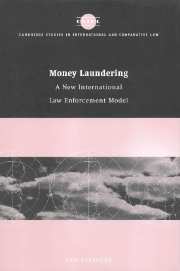Book contents
- Frontmatter
- Contents
- Preface
- Table of treaties and agreements
- List of abbreviations
- Part I New instruments in the fight against acquisitive crime: confiscation of proceeds from crime and criminalisation of money laundering
- Part II The prevention of money laundering
- 4 The application field of legislation on the prevention of money laundering
- 5 The role of financial institutions in the prevention of money laundering
- 6 The role of financial intelligence units in combating money laundering
- 7 The role of the supervisory authorities in combating money laundering
- Part III Jurisdiction over money laundering
- Part IV International co-operation in combating money laundering
- Epilogue
- Bibliography
- Index
- CAMBRIDGE STUDIES IN INTERNATIONAL AND COMPARATIVE LAW
7 - The role of the supervisory authorities in combating money laundering
Published online by Cambridge University Press: 16 October 2009
- Frontmatter
- Contents
- Preface
- Table of treaties and agreements
- List of abbreviations
- Part I New instruments in the fight against acquisitive crime: confiscation of proceeds from crime and criminalisation of money laundering
- Part II The prevention of money laundering
- 4 The application field of legislation on the prevention of money laundering
- 5 The role of financial institutions in the prevention of money laundering
- 6 The role of financial intelligence units in combating money laundering
- 7 The role of the supervisory authorities in combating money laundering
- Part III Jurisdiction over money laundering
- Part IV International co-operation in combating money laundering
- Epilogue
- Bibliography
- Index
- CAMBRIDGE STUDIES IN INTERNATIONAL AND COMPARATIVE LAW
Summary
Whereas prudential supervision originally was limited to quantitative, economic aspects, it has gradually extended to cover qualitative aspects, such as ensuring that financial institutions, their management and their shareholders, are fit and proper. Various international instruments have emphasised the role financial and credit institutions can play in the fight against money laundering. The Statement of Principles issued by the Basle Committee in 1988 had already warned that supervisors could not remain indifferent to the use made of banks by criminals. The FATF underlined the importance of supervisory authorities in the implementation of money laundering measures and asked for prudential supervision to be extended to cover non-bank financial institutions. The close nexus between the definition of the application field of the ratione personae of preventive legislation and prudential supervision has already been underscored at the beginning of Part 2 but it is clear that the effective functioning of a suspicion-based reporting system is – to a much greater extent than a threshold-based reporting system – dependent on thorough bank supervision.
Whereas supervisory authorities have a wide range of options to hand with which to fight money laundering (as exemplified by Article 17 of the CICAD Model Regulations), their main tasks in combating money laundering are twofold. First, they can inform the authorities responsible for combating money laundering (i.e. the FIUs) of any money laundering operations they may detect in the course of their supervision activities. In addition, they have mostly administrative powers to punish financial institutions that have failed to observe anti-money laundering rules.
The duty of supervisory authorities to report facts of money laundering
In its recommendations 26 and 27 the FATF asks that supervisory authorities co-operate with judicial and police authorities.
- Type
- Chapter
- Information
- Money LaunderingA New International Law Enforcement Model, pp. 200 - 206Publisher: Cambridge University PressPrint publication year: 2000

